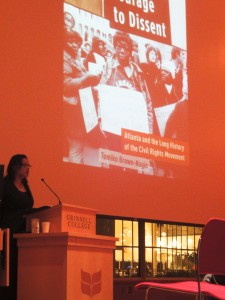Tomiko Brown-Nagin, a professor of law at the University of Virginia Law School addressed Grinnellians on Tuesday, January 31. She holds both a law degree from Yale and Ph.D in history from Duke. While visiting Grinnell she discussed her new book, Courage to Dissent, a work that examines the role of the legal system in the Civil Rights movement.

Oxford University Press recently published your book, Courage to Dissent, “A work about lawyers, courts and community-based activism during the Civil Rights Era,” according to Virginia Law’s website. What personal experiences gave you the inspiration to write this book?
That is a very good question, and I would say a couple of things. First, I grew up in South Carolina, which is a state that has a deep racial history. As I grew up, I was among one of the first students to attend a desegregated school after Brown vs. Board of Education. That was in the early 1970s. So I grew up interested in civil rights and the law at a very early age. I wanted to be a civil rights lawyer from a very early age, but as I made the decision to attend a small liberal arts college—Furman University I am sure similar in many ways to Grinnell—I immediately fell in love with one of my history professors and just wanted to be her. So I had this torturous choice about whether to go to law school or to get a history degree, and a long story short, I applied to both and therefore didn’t make a decision, thinking that the graduate schools could decide for me. But that did not quite work out. As I continued with my schooling, I came to realize that out that there is not actually tension between being a lawyer interested in civil rights and being a historian. And I joined both of these interests in my book, which is a social history, but it is also a history talking a lot about the passage of the law. The point of the book is really to consider how the cases impact the people; I am most interested in how people experience the law. When I talk about Brown vs. Board of Education, my perspective is, well, what actually happened before Brown. That is the framework that I used for talking about all of the cases [in the book].
Do you find it difficult to balance your work between pursuing your interests in law while including a historical perspective?
It is probably because I am so interested in issues of policy and present issues that I did choose to be a law professor as opposed to – let’s say a history professor. In regards to your question, like in all areas of life, it can be an important issue to properly allocate time; but on the other hand, I do have a particular job and most of my energy is geared toward scholarship and teaching my students. To the extent that I am able to do things like write about op-eds or reports, that is something that I will do, but that takes up much less of my time.
I understand that you worked under Judge Robert Lee Carter for some time and I am interested in that experience and also how working as a litigation associate has affected your work today. What types of things did you learn while you served in these positions?
Yes, I worked for two judges, Judge Robert Lee Carter being one of them, and he actually just passed away and it happens that I wrote a tribute to him. What I learned from that, in a nutshell, is professionalism; simply what it means to be a professional. And let me just say a word about the judge. What I took away from my experience with the judge is that it is really important to project yourself and to try to see the other side of current events. There are some people who are so bombastic and so convinced that they are right that they cannot do that very well. Some of those people make fabulous policy trial lawyers, but not necessarily law professors or your everyday run of the mill lawyers, so balance is important. I also learned how to be respectful of all types of people, and that working hard is important. These are basic things, needed in all walks of life, but it was very important for me to see a person who was so successful project these fundamental values.






















































